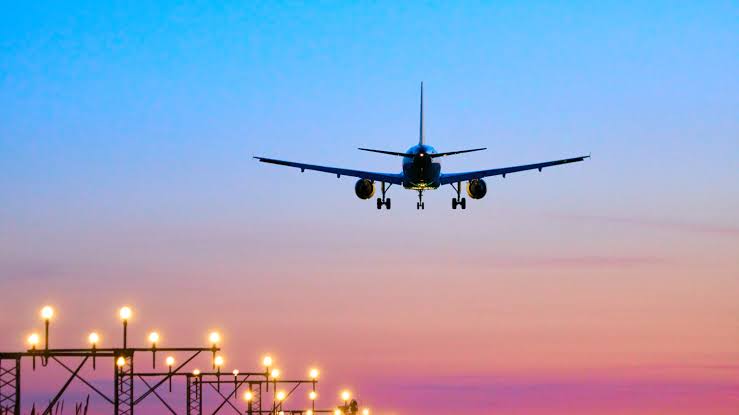Aviation
Airlines Struggle With Trapped Funds As Fares Soar In Nigeria

Airlines operating in Nigeria are struggling with trapped funds, which have risen sharply in recent months despite efforts to reduce them.
According to a recent report, airlines’ trapped funds in Nigeria increased from $744 million in March to $802 million in April, despite measures to collect ticket sales in dollars.
One of the main reasons for the increase in trapped funds is the significant rise in fares for passengers paying in naira.
For instance, a return ticket from Nigeria to London has gone up from N350,000 to about N1.5 million and N1.8 million (for passengers paying in naira). This has discouraged passengers from purchasing tickets, forcing them to use dollar cards instead.
According to Susan Akporiaye, President of NANTA, “a Lagos-London return ticket that cost N350,000 is now being sold for N1.8 million. If you issue one economy class ticket, it should have been just N350,000 that is trapped, but now one economy ticket means N1.8 million is trapped. This means it will triple the effects of trapped funds because these are selling higher, and because we are selling higher, the trapped funds are increasing. But if we are selling N350,000, it should not have increased.”
Akporiaye explained that high fares are the reason the trapped funds will keep increasing. She said that in such a short time, the trapped funds have moved from $700m to over $800m because, for instance, a business class ticket in the US that was sold for N2.5m is now almost N6m.
NANTA stated that the measures deployed by airlines to reduce ticket sales in naira have seen airlines recoup over 50% of their ticket sales in foreign currencies, thereby reducing the amount of money trapped in Nigeria.
Airlines have stopped travel agents in Nigeria from issuing tickets emanating from other countries into Nigeria since last year in a bid to reduce the amount of money that would be trapped in Nigeria.
To reduce ticket sales in naira, airlines have deployed various measures, such as blocking low ticket inventories and leaving high inventories to be sold in naira only. However, these measures have not been effective in reducing trapped funds.
The development has since seen Nigerian travellers bypass travel agents in Nigeria to purchase tickets from agents in Ghana and other African countries over skyrocketing fares as a result of the trapped funds.
This is in a bid to cushion the effect of their trapped funds in Nigeria. Delta Airlines, the sole US carrier flying into Nigeria from its base in Atlanta Georgia, has been selling air tickets to travellers in dollars.
Jimmy Echelgruen, the airlines sales director for Africa, the Middle East and India, confirmed the development.
Bankole Bernard, chairman of Airlines and Passengers’ Joint Committee of the International Air Transport Association, said that despite challenges facing Nigeria’s travel sector, foreign airlines operating in Nigeria realised over $1.1 billion from ticket sales in Nigeria in 2022.
Bernard, who disclosed that the foreign airlines are making good money from Nigeria, even though the trapped funds challenges still persist.
He said: “The airlines have sold more. In the whole of Africa, Nigeria sales are still the highest. We have done over $1.1billion in 2022. We are doing much better than our contemporaries.
“We are a good market and a market that any airline would want to come into. Nobody will talk about the good side of this market. Nigerians are still travelling. The only thing is that travel agents are losing business to outside the country. Most of us are buying tickets from other travel agencies from around the world.” he added.
Aviation
NCAA Cracks Down On Pilots Working For Multiple Airlines
The Nigeria Civil Aviation Authority (NCAA) has announced stringent measures against pilots and crew members who work for multiple airlines concurrently, a practice it describes as a serious safety violation.
In a letter dated November 6, 2024, Acting Director-General, Chris Nojomo warned that pilots operating for more than one airline without specific safety protocols pose significant risks to Nigeria’s aviation sector.
READ MORE: Obasanjo Visits Ondo Gov, Offers Support Ahead of Election
The directive, titled “Prohibition of Ad-Hoc Flight Operators for Multiple Airlines,” noted that NCAA surveillance reports revealed multiple cases of unauthorized cross-airline work by flight crews, which the agency now plans to address.
According to the NCAA, simulator and proficiency checks endorsed on a pilot’s license are valid only for the specific airline and training program under which they were issued.
The letter stated, “With effect from the date of issuance of this directive, all operators and holders of pilot licenses are informed that this action will be treated as a violation of the Nigeria Civil Aviation Regulations.”
The NCAA’s new policy, effective November 11, 2024, warns that violators will face strict enforcement actions. Moving forward, simulator renewals will also be filed directly with individual operators, further tightening the agency’s oversight.
Aviation
Akwa Ibom Boosts Ibom Air Fleet With Two New Aircraft
In a bold step to strengthen Akwa Ibom’s position in Nigeria’s aviation industry, Governor Umo Eno announced the addition of two new Bombardier CRJ900 aircraft to the fleet of the state-owned airline, Ibom Air, on Friday.
The two aircraft, registered as 5N-CED and 5N-CEE, mark a milestone in the state’s commitment to strategic investment, with the governor stressing that the acquisitions were fully funded by state resources without loans from financial institutions.
READ ALSO: FCTA Allocates N9.8bn To Upgrade Abuja Airport’s Presidential Wing
At a welcoming ceremony attended by local officials and residents, Governor Eno emphasized his administration’s mission to drive revenue-generating ventures for Akwa Ibom rather than relying on debt.
He called the move a step toward breaking the cycle of government investments that only serve to pay off loans, vowing that the state’s funds would go towards projects that bring returns to the people.
The governor challenged Ibom Air to turn a profit by 2025, stating that the airline’s management should ensure routes in and out of Uyo remain dependable to prioritize the needs of Akwa Ibom travelers.
“As long as I remain governor, we will continue to use state funds for the benefit of all, not for private gain,” he said, noting that his administration aims to ensure that public investments deliver real value to the state.
Governor Eno also provided updates on several ambitious state projects, including an 18-story commercial complex underway in Lagos and an upcoming 4-star hotel in Abuja, both designed to generate revenue for Akwa Ibom.
Plans for an international market in Ikot Ekpene and the phased opening of a new terminal at the Victor Attah International Airport were also announced, with the airport terminal set for partial operation by December and full activation in early 2025.
Speaker of the Akwa Ibom State House of Assembly, Udeme Otong, commended Eno’s financial management, highlighting that the administration has avoided seeking loans over the past 18 months despite launching significant development projects.
Ibom Air’s Chairman, Pastor Imoabasi Jacob, expressed appreciation for the state’s investment in the airline, which has seen its fleet grow to nine aircraft.
Jacob credited the governor’s support with enabling Ibom Air to boost flight capacity, meeting demand on popular routes such as Uyo-Lagos-Abuja.
Captain Mfon Udom, CEO of Ibom Air, stated that the expanded fleet will improve efficiency and allow the airline to scale up its operations in time for the Christmas travel season.
Udom also noted that the airline anticipates the delivery of nine additional Airbus planes, which will further strengthen Ibom Air’s market presence.
Traditional leaders, including HRM Edidem Ita Edet Okokon III of Okobo Local Government Area, lauded the governor’s leadership, pledging continued support from the traditional institutions.
Anie Essienette, Group Manager for Marketing and Communications at Ibom Air, noted that demand for the airline’s services has surged nationwide, with the new CRJ900 aircraft helping meet this increasing need while the airline awaits further fleet expansion.
Aviation
BREAKING: Private Air Strip Owners Pay Handsomely – Keyamo

Nigeria’s Minister for Aviation and Aerospace Development, Festus Keyamo is of the view that there’s no cause for alarm over the approval of a private airstrip for a religious organisation, which attracted the attention of the House of Representatives.
He took to his verified handle on micro-blogging site, X, on Friday morning to shed light on the subject, and explained that it could be a great source of revenue for Federal Government.
Keyamo asserted that the issue was raised by an honourable member at plenary, out of ignorance, but was “unanimously referred to the Aviation Committee to look into.”
ALSO READ: Why Foreign Airlines Must Patronise Nigerian Caterers – Keyamo
Keyamo expressed confidence that by the time his Ministry was done enlightening them, “they will be satisfied”.
He added that “the privates air strip owners pay the Federal Government handsomely for these services.”
Keyamo wrote, “I think this is not correct. The House of Reps. as a body did not call on the Minister to revoke the license of any private airstrip.
“I think what happened is that someone moved a motion in that regard and it was unanimously referred to the Aviation Committee to look into it.
“Whilst the intention of the Hon. Member who moved it is very patriotic, it was based on a complete lack of knowledge of the aviation sector.
“By the time we explain to them how private air strips work and the processes they undergo by our agencies before the final approval, they will be satisfied.
“The responsibility of the owners of private air strips is just to build the runway and terminal building. But after they build the control tower in particular, it is completely handed over to the Federal Government through NAMA (Nigerian Airspace Management Agency) which is in complete control of the entire airspace in Nigeria. An MOU is usually signed with NAMA in this regard before the airstrip is approved for operations.
“It is NAMA that provides the Air Traffic Controllers and Engineers in ALL AIRPORTS and AIRSTRIPS IN NIGERIA. And the privates air strip owners pay the Federal Government handsomely for these services.
“No object flies into Nigeria without the prior clearance by NAMA and without filing a clear flight plan, eg, where it is taking off from and where it intends to land.
“And I have recently directed that all aircraft coming into the country MUST first land at our international airports where they would be properly processed and checked before they make their local flights into whatever airport or airstrip they intend to go. So, it is COMPLETELY AND TOTALLY impossible for any private airstrip owner to just jump on an aircraft and fly in and out of the country through that facility. The Federal Government does not permit that. You will not be cleared for take off or landing without prior request and authorisation.
“I thank the Member for his patriotism, but I wish he contacted us first to explain to him before rushing to move such a motion.
“I attach herewith for public consumption the NAMA Act that gives exclusive control of the Nigerian airspace to the Federal Government through NAMA.”














